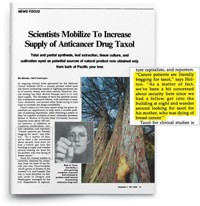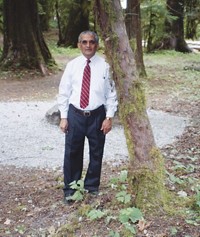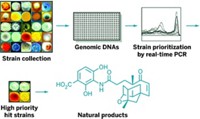Advertisement
Grab your lab coat. Let's get started
Welcome!
Welcome!
Create an account below to get 6 C&EN articles per month, receive newsletters and more - all free.
It seems this is your first time logging in online. Please enter the following information to continue.
As an ACS member you automatically get access to this site. All we need is few more details to create your reading experience.
Not you? Sign in with a different account.
Not you? Sign in with a different account.
ERROR 1
ERROR 1
ERROR 2
ERROR 2
ERROR 2
ERROR 2
ERROR 2
Password and Confirm password must match.
If you have an ACS member number, please enter it here so we can link this account to your membership. (optional)
ERROR 2
ACS values your privacy. By submitting your information, you are gaining access to C&EN and subscribing to our weekly newsletter. We use the information you provide to make your reading experience better, and we will never sell your data to third party members.
Biological Chemistry
Fenical's Fascinating Finds
Delving deeper into the sea, renowned natural products researcher continues to reap surprising harvest
by A. Maureen Rouhi
March 27, 2006

At an award symposium for the American Chemical Society's Ernest Guenther Award in the Chemistry of Natural Products, held on March 26 in Atlanta, the 2006 winner, William Fenical of the University of California, San Diego, and Scripps Institution of Oceanography, sounded eager as ever, decades after he embarked on his career-long fascination with natural products from the sea.
Fenical is convinced that the ocean's depths are a rich source of new compounds with therapeutic potential. In the late 1990s, he said, he began concentrating on bacteria growing on the sea floor. Initially sampling at depths of about 100 feet, his reach progressively descended to depths of thousands of feet. One of the most surprising discoveries from these deep-sea explorations is the discovery of actinomycetes that have never been seen before. Actinomycetes are a group of bacteria that have been a rich source of antibiotics and other drugs for human health. They are abundant in the soil but were not thought to exist in the marine environment.
The deep-sea bacteria resemble those in the Micromonosporaceae family except that they require salt to survive and grow, Fenical said. Collectively, these bacteria have been designated as the genus Salinispora. To date, he pointed out, 80% of the strains researchers have collected inhibit cancer cell growth at submicromolar concentrations, and 75% have antibiotic activity against drug-resistant bacteria.
In 2003, Fenical's group described salinosporamide A, the first natural product from the new genus (C&EN, Jan. 20, 2003, page 37). Isolated from S. tropica, the compound is selectively and potently toxic to certain cancers, including colon and breast cancers. Fenical said an Investigational New Drug Application has been filed, and the compound is scheduled for human clinical trials in May.
Since 2003, many other compounds have been isolated and characterized, including sporolides A and B from fermentation broths of S. tropica, cyanosporosides A and B from a Salinispora species tentatively designated S. pacifica, and 26-ring macrolides from S. arenicola. The genome of S. tropica, which has been fully sequenced, indicates the organism's ability to biosynthesize 15 natural products, and only two of those have been seen so far, Fenical pointed out. The genome also indicates that the compounds likely are derived from enediyne polyketide biosynthetic pathways, he said.
These results are only the most recent payoffs of what Tadeusz F. Molinski, chemistry and biochemistry professor at UC San Diego and the symposium chair, described as Fenical's "phenomenal record of research risk taking." In turn, Fenical credited the National Cancer Institute for taking "a big risk in funding this research 10 years ago. We didn"t know then what we will find, where this will go; it is now paying off."





Join the conversation
Contact the reporter
Submit a Letter to the Editor for publication
Engage with us on Twitter